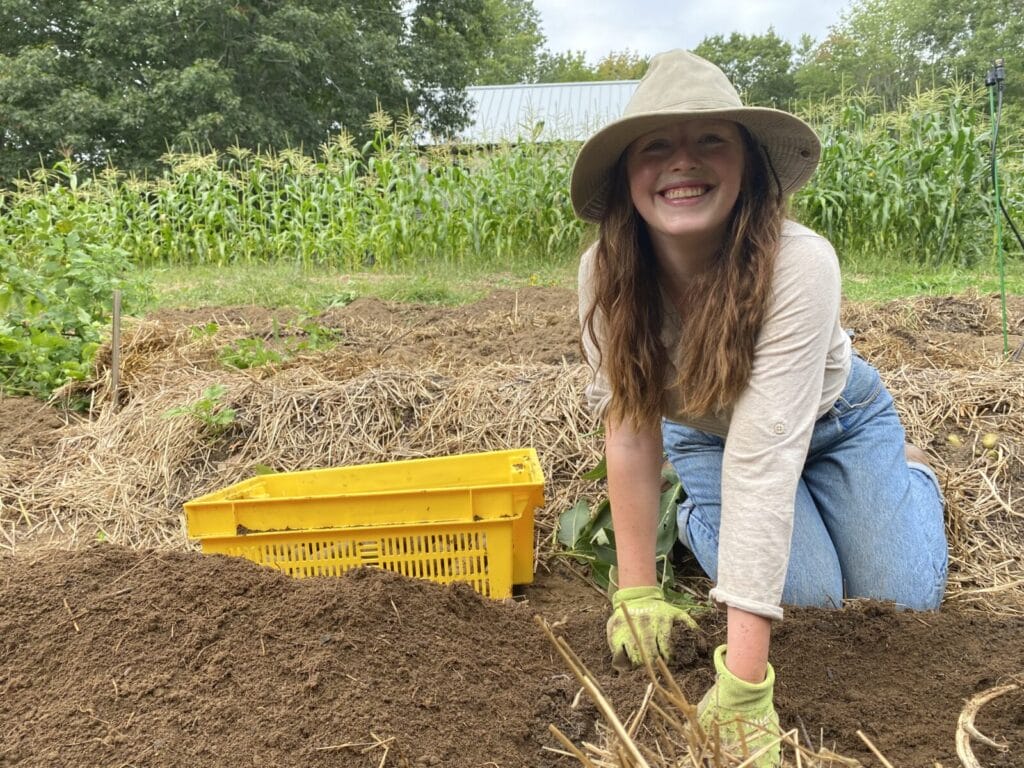
In this series, we’re meeting with Swette Center team members to explore their background in food systems, what they are currently working on, and their vision of food systems transformation.
Read on for an interview with Kelly Benoit, Research Analyst.
When did you first get interested in food systems work?
I started out my career as a wildlife ecologist, which is what I studied for my undergraduate degree. Through this opportunity, I was able to work on a project partially focused on how environmental quality on farms impacts butterfly diversity. This experience sparked my interest in the ecology aspect of food systems and I decided to add on a second major of sustainability in school. Then, during the COVID-19 pandemic, I traveled around the country and worked at various farms through personal connections and World Wide Opportunities on Organic Farms (WWOOF). This ignited an obsession with food systems because I got to work with farmers and my perspective changed from viewing farming through an ecology lens to a systems thinking lens. After this, I decided to go back to school to get my Master’s degree, and that’s where I got interested in agroecology.
What are you working on currently?
I am currently working as a data analyst at the Swette Center, focusing on our lead role in the national USDA Transition to Organic Partnership Program, also known as TOPP. The Swette Center works as a contractor for various partners across the nation to manage and analyze their TOPP data. This includes data primarily looking at outreach efforts through TOPP events, the mentorship program, and technical assistance. My responsibility is to communicate effectively with all our partners to ensure accurate reporting and measure the success of TOPP in helping U.S. farmers transition to organic.
What do you think is a priority in transforming food systems?
For me, a priority is fostering a cultural shift in how society views our agricultural system. It’s not just an economic sector, it’s not just a goal to feed enough people, and it’s not just an environmental concern. It is an interconnected web that has the power to uplift communities. We’ve been pushing the land to produce as much food as possible but we need to create a food system that also prioritizes taking care of the environment and our communities.
There are people out there who are changing the culture around food, and have been for decades. These are large organized movements like La Via Campesina, cooperatives, local grassroot movements, nonprofit organizations and indigenous communities who have a vision for a sustainable, equitable food system built on care for each other and the land. Cultural change by people-led movements is how long-term cultural transformation can happen. So while changing the culture around how we interact with food is a difficult thing to pin down, I think getting involved with these kinds of groups is an actionable way that we can push people to change how they view their food as a relationship with their neighbors, the soil, and the broader community. I personally can attest to how interacting with leaders within the grassroots or justice space has been for me when looking at how I view food systems.
Any advice for current food systems students?
I had a very complex student experience in terms of how I got into food systems, and I think that it’s so easy as a student to get stuck in one viewpoint when you’re looking at an issue. It’s really important to take classes or interact with diverse individuals in the community, or even just talk to professors who have different perspectives. If I hadn’t ventured outside my ecological background, I wouldn’t be where I am today. Having an interdisciplinary approach to food systems issues is really crucial, and it can introduce you to new ideas you don’t expect to be interested in.
What is your favorite food to make?
My go-to favorite food to make is always going to be risotto. It was the first thing my sister taught me to make. So for me it’s a comfort food, but it also lends really well to any seasonal veggie that’s around—I can just toss those in, or add them on the side. It’s really the perfect food for any occasion because it’s very versatile and I love to make it whether I’ve had a bad day or I’m hosting guests for dinner!